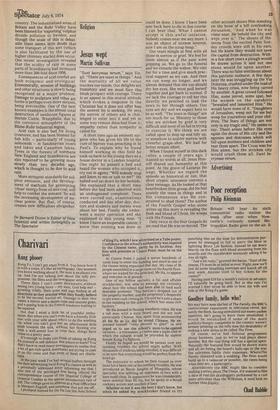Religi o n
Jesus wept
Martin Sullivan
"Sunt lacrymae rerum," says Virgil. "There are tears in things." And the mortality of all we value touches our minds. Our delights are transitory and we must face this bleak prospect with courage. There is an appeal in this stoical attitude which evokes a response in the Christian but it does not offer him the answer he is seeking. He sees the sorrow of others and is challenged to enter into it and yet in some way remain detached from it; empathy rather than sympathy is called for.
A short time ago an eminent surgeon who has given his life to the cure of leprosy was preaching in St Paul's. To explain why he found himself working in this field he took us back to his young days as a house doctor in a London hospital, One night he passed a bed and heard the woman who occupied it, cry out in agony,"Will nobody stop and listen to me or talk to me?" He halted and sat down by her bedside. She explained that a short time before she had been admitted with an undiagnosed complaint. Tests were carried out, examinations conducted and day after day, doctors and students and nurses were about her bed. Finally she underwent a major operation and she explained to this young man. "I know 1 have an inoperable cancer. I know that nothing was done or could be done. I know I have been sent back here to die in due course. I can bear that. What I cannot accept is this awful isolation. Nobody,comes near me any more. I was an object of intense interest, now I am on the scrap heap."
Our tears mingle at first with all those in sorrow or grief. We feel for them almost as if the pain were gripping us. We go to the funeral and we console the widow. We visit her for a time and give much practical support as we can. And then we can weep no longer, and we almost demand that she too should dry her eyes. She must pull herself together and get back to normal. If we lack the courage to tell her this directly we proceed to leak the news to her through others. Our eyes are dry and we expect hers to be as well. "The tears in things" are too much for us. Ministry to those who are stricken by grief is very difficult and most of us fail in trying to exercise it. We think we are called upon to mop up and tidy up, or somehow to scatter sorrow with cheerful grape-shot. We had far better remain silent.
When I found myself in this dark .valley a couple of years ago, I wanted no words at all. Jesus Himself shared our humanity at this point. At the grave of Lazarus He wept. Whether we regard the episode as historical or not, that short cryptic utterance conveys a clear message. As He looked at that heartbroken little group, did He feel acutely the tears in things and in His compassion was He constrained to shed them? The author of the Fourth Gospel who alone writes up this story is revealing the flesh and blood of Christ. He weeps with His Friends.
Only twice in the four Gospels do we read that He was so moved. The
other account shows Him standing on the brow of a hill overlooking Jerusalem, "And when he was come near, He beheld the city and wept over it." The shouts of Hosanna from the excited Palm Sunday crowds were still in his ears, but He knew they would not save the capital from destruction. Within a few short years a plough would be drawn across it and not one stone would lie upon another. There was no false sentiment about this patriotic outburst. A few days later He was struggling up the Via Dolorosa, crushed under the load of His heavy cross, now being carried by another. A great crowd followed Him, some jeered, some spat, but the women on the outskirts "bewailed and lamented Him." He would have none of it. "Daughters of Jerusalem, weep not for me but weep for yourselves and your children. The fears of things are not only in my tragic end," He seems to say. There arises before His eyes again the doom of His city and the agonies and distresses which will fall upon mothers and children and tear them apart. The Cross was for Him alone, but the stricken city would crush them all. Stint lacrymae rerum.


































 Previous page
Previous page